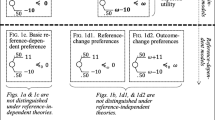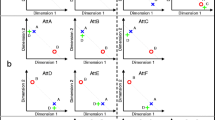Abstract
Generic utility theory, a general axiomatization of utility principles developed by Miyamoto (1988, 1992), is discussed as a formulation that captures a large class of utility theories. Several general mathematical functions were used to specify further the scaling of utility within this class of models. The scaling parameters in the generic utility representation should remain invariant across gambling contexts, and this predicted invariance provided a means for testing the theory. Evidence is presented that the prediction of scaling-parameter invariance is violated. This failure is interpreted as a consequence of employing an absolute reference system for a problem that is context-sensitive.
Similar content being viewed by others
References
Allais, M. (1953). ‘Le Comportement de L'homme Rationnel Devant le Risque: Critique des Postulats et Axiomes de L'ecole Americaine,’ Econometrica 21, 503–546.
Becker, J. L., and R. K. Sarin (1987). ‘Lottery Dependent Utility,’ Management Science 33, 1367–1382.
Bernoulli, D. (1738). ‘Specimen Theoriae Novae de Mensura Sortis,’ Comentarii Academiae Scientiarum Imperiales Petropolitanae 5, 175–192.
Chechile, R., and H. Fowler (1973). ‘Primary and Secondary Negative Incentive Contrast in Differential Conditioning,’ Journal of Experimental Psychology 97, 189–197.
Chew, S. (1983). ‘A Generalization of the Quasilinear Mean with Applications to the Measurement of Income Inequality and Decision Theory Resolving the Allais Paradox,’ Econometrica 51, 1065–1092.
Edwards, W. (1962). ‘Subjective Probabilities Inferred from Decisions,’ Psychological Review 69, 109–135.
Einstein, A. (1956). The Meaning of Relativity (5th ed.). Princeton, NJ: Princeton University Press.
Fishburn, P. C. (1983). ‘Transitive Measurable Utility,’ Journal of Economic Theory 31, 293–317.
Hull, C. L. (1943). Principles of Behavior, An Introduction to Behavior Theory. NewYork: D. Appleton-Century.
Kahneman, D., and A. Tversky (1979). ‘Prospect Theory: An Analysis of Decision Under Risk,’ Econometrica 47, 263–291.
Karmarkar, U. S. (1978). ‘Subjectively Weighted Utility: A Descriptive Extension of the Extension of the Expected Utility Model,’ Organization Behavior and Human Performance 21, 623–638.
Luce, R. D. (1988). ‘Rank-Dependent, Subjective Expected-Utility Representations,’ Journal of Risk and Uncertainty 1, 305–332.
Luce, R. D. (1990). ‘Rational Versus Plausible Accounting Equivalences in Preference Judgments,’ Psychological Science 1, 225–234.
Luce, R. D. (1992a). ‘Singular Points in Generalized Concatenation Structures That Otherwise Are Homogeneous,’ Mathematical Social Sciences 24, 79–103.
Luce, R. D. (1992b). ‘Where Does Subjective Expected Utility Fail Descriptively?’ Journal of Risk and Uncertainty 5, 5–27.
Luce, R. D., and P. C. Fishburn (1991). ‘Rank-and Sign-Dependent Linear Utility Models for Finite First-Order Gambles,’ Journal of Risk and Uncertainty 4, 29–59.
Luce, R. D., and P. C. Fishburn (1995). ‘A Note on Deriving Rank-Dependent Utility Using Additive Joint Receipts,’ Journal of Risk and Uncertainty 11, 5–16.
Luce, R. D., and L. Narens (1985). ‘Classification of Concatenation Measurement Structures According to Scale Type,’ Journal of Mathematical Psychology 29, 1–72.
MacCrimmon, K. R., and S. Larson (1979). ‘Utility Theory: Axioms and Paradoxes.’ In M. Allais and O. Hagen (eds.), Expected Utility Hypothesis and the Allais Paradox. Dordrecht, The Netherlands: Reidel.
Machina, M. J. (1989). ‘Dynamic Consistency and Non-Expected Utility Models of Choice under Uncertainty,’ Journal of Economic Literature XXVII, 1622–1668.
Madansky, A. (1959). ‘The Fitting of Straight Lines When Both Variables Are Subject to Error,’ Journal of the American Statistical Association 54, 173–205.
Miyamoto, J. M. (1988). ‘Generic Utility Theory: Measurement Foundations and Applications in Multiattribute Utility Theory,’ Journal of Mathematical Psychology 32, 357–404.
Miyamoto, J. M. (1992). ‘Generic Analysis of Utility Models.’ In Ward Edwards (ed.), Utility Theories: Measurements and Applications. Boston: Kluwer Academic Publishers.
Miyamoto, J. M., and S. A. Eraker (1989). ‘Parametric Models of the Utility of Survival Duration: Tests of Axioms in a Generic Utility Framework,’ Organizational Behavior and Human Decision Processes 44, 166–202.
Stevens, S. S. (1957). ‘On the Psychophysical Law,’ Psychological Review 64, 153–181.
Stevens, S. S. (1959). ‘Measurement, Psychophysics and Utility.’ In C. W. Churchman and P. Ratoosh (eds.), Measurement: Definitions and Theories New York: Wiley, pp. 18–63.
Tukey, J. W. (1977). Exploratory Data Analysis. Reading, MA: Addison-Wesley.
Tversky, A. (1967). ‘Additivity, Utility, and Subjective Probability,’ Journal of Mathematical Psychology 4, 175–201.
Tversky, A., and D. Kahneman (1981). ‘The Framing of Decisions and the Probability of Choice,’ Science 211, 453–458.
von Neumann, J., and O. Morgenstern (1947). Theory of Games and Economic Behavior. Princeton, NJ: Princeton University Press.
Wakker, P. (1989a). Additive Representations of Preferences: A New Foundation of Decision Analysis. Dordrecht, The Netherlands: Kluwer Academic Publishers.
Wakker, P. (1989b). ‘Continuous Subjective Expected Utility with Non-Additive Probabilities,’ Journal of Mathematical Economics 18, 1–27.
Author information
Authors and Affiliations
Rights and permissions
About this article
Cite this article
Chechile, R., Cooke, A. An Experimental Test of a General Class of Utility Models: Evidence for Context Dependency. Journal of Risk and Uncertainty 14, 75–93 (1997). https://doi.org/10.1023/A:1007773804402
Issue Date:
DOI: https://doi.org/10.1023/A:1007773804402




